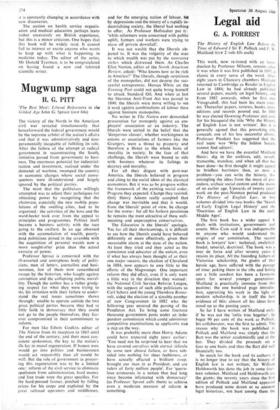Mugwump saga
H. G. PITT
'The Best Men': Liberal Reformers in the Gilded Age John G. Sproat (out' 64s)
The victory of the North in the American civil war revealed simultaneously that henceforward the federal government would be the supreme arbiter of the nation's affairs and that it was administratively and tem- peramentally incapable of fulfilling its role. After the failure of the attempt at radical government in reconstructing the South, initiative passed from government to busi- ness. The enormous potential for industrial- isation and investment, realised under the demands of wartime, swamped the country in economic changes whose social conse- quences were ill-understood and largely ignored by the political parties.
The most that the politicians willingly attempted was to adjust their techniques for obtaining power by recognising that the electorate, especially the new mobile popu- lations of the swelling cities, had to be organised: the activities of the boss and the ward-heeler took over from the appeal to principles and programmes. Politics itself became a business activity with the race going to the swiftest. In an age obsessed with the accumulation of wealth, poorly- paid politicians joined in the scramble with the acquisition of personal wealth now a more sought-after prize than the actual exercise of power.
Professor Sproat is concerned with the ill-assorted and amorphous body of politi- cians, men of letters, journalists and busi- nessmen, few of them now remembered except by the historian, who fought against corruption and the collapsing public moral- lity. Though the author has a rather grudg- ing respect for what they were trying to do, his irritation with their failure to under- stand the real issues sometimes shows through: unable to operate outside the two great political parties because they had so little faith in democracy that they could not go to the people themselves, they for- ever compromised in their commitment to reform.
For men like Edwin Godkin, editor of The Nation from its inception in 1865 until the end of the century, and their most con- sistent spokesman, the key to the nation's ills by in moral regeneration. If honest men would go into politics and businessmen would act responsibly then all would be well. But the role of government in procur- ing this regeneration was to be a limited one: reform of the civil service to eliminate spoilsmen from administration, hard money and free trade were the great specifics. For the hard-pressed farmer, pinched by falling prices for his crops and exploited by the great railroad operators and middlemen,
and for the emerging nation of labour, hit by depressions and the misery of a rapidly in- dustrialising society, the liberal had nothing to offer. As Professor Hofstadter put it: 'while reformers were concerned with public uplift, farmers and workers were trying to stave off private downfall'.
It was not wealth that the liberals ob- jected to. It was the vulgarity of the uses to which wealth was put by the nouveaux riches which distressed them. As Charles Eliot Norton, editor of the North American Review, asked: 'Who knows how to be rich in America?' The liberals, though suspicious of the monopolies, did not despise the suc- cessful entrepreneur. Horace White on the Evening Post could not quite bring himself to attack Standard Oil. And when at last the Sherman Anti-Trust Act was passed in 1890, the liberals were more willing to see it used against combinations of labour than against business monopolies.
No writer in The Nation ever demanded prosecution for monopoly against an em- ployers' association or an industry. The liberals were united in the belief that the 'dangerous classes', whether workingmen in unions or associations of farmers like the Grangers, were a threat to property and therefore a threat to the whole basis of morality in society. In the face of that challenge, the liberals were bound to side with business whatever its failings in decency and morality.
For all their disgust with post-war America, the liberals believed in progress and clung to the social ideas of the classical economists. But it was to be progress within the framework of the existing social order. Progress they expected. Change they resisted. Only Henry Adams really accepted that change was inevitable and that it would, from the liberals' point of view, be change for the worse: for all his forlorn pessimism he remains the most attractive of these well- meaning and unperceptive conservatives.
The Education is the liberals' apologia. Yet for all their shortcomings, it is difficult to see how the liberals could have behaved differently or more effectively, given their reasonable alarm at the state of the nation. At least they tried and they acted as the conscience and educator of the nation, even if what has always been thought of as their one major success, the election of Cleveland in 1884, now appears to owe little to the efforts of the Mugwumps. One important reform they did effect, even if it only went a little way in the direction they wanted: the National Civil Service Reform League, with the support of such able politicians as Carl Schurz and the young Theodore Roose- velt, aided the election of a sizeable number of new Congressmen in 1882 who the following year ensured the passing of the Pendleton Act. To bring some fourteen thousand government posts under an inde- pendent commission which could administer competitive examinations to applicants was a step on the way.
It was probably more than Henry Adams could have expected eight years earlier: 'You need not be surprised to hear that we have covered ourselves with eternal ridicule by some new absurd failure, or have sub- sided into nothing for sheer feebleness, or have actually effected a brilliant coup, brought our man in as President, and are rulers of forty million people'. For 'queru- lous aristocrats in a nation that had long since become infatuated with democracy'
(as Professor Sproat calls them) to achieve even a moderate measure of reform is something.


































 Previous page
Previous page